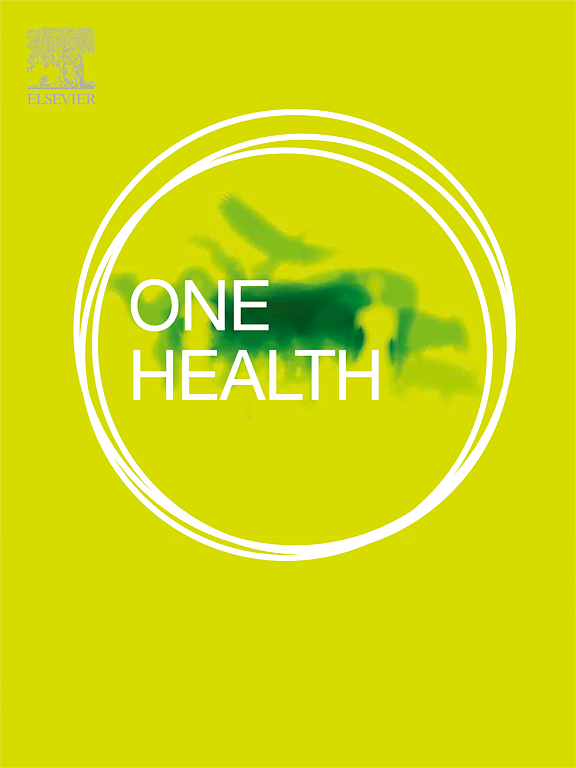Poultry-associated nitrofurantoin-resistant and pre-resistant Escherichia coli clones are found in multiple countries and one-health compartments
IF 4.5
2区 医学
Q1 INFECTIOUS DISEASES
引用次数: 0
Abstract
Escherichia coli is the most common cause of urinary tract infection (UTI) in humans. The nitrofuran-class antibacterial drug nitrofurantoin is a frequent UTI therapy, with resistance rarely observed. Here we show that nitrofurantoin resistant (NFT-R) E. coli are sometimes excreted by dogs fed a raw meat diet in the city of Bristol, United Kingdom, and that NFT-R and pre-resistant (one mutation away from NFT-R) E. coli can be found contaminating chicken meat sold for human consumption and chicken-based raw dog food in the same city. Using whole genome sequencing, we identified multiple NFT-R or pre-resistant E. coli clones spanning several phylogroups. These clones were dominated by isolates from poultry farms and poultry meat in Europe, Canada, the United States and Japan, and we identified instances where closely related NFT-R and pre-resistant isolates have colonised humans and caused UTIs. The origins of these poultry-associated NFT-R and pre-resistant E. coli clones are uncertain, but nitrofuran-class antibacterials (particularly furazolidone, furaltadone, and nitrofurazone) were used in poultry production during the 1970s and 80s, though this practice has been banned since the 1990s. It is possible, therefore, that this caused an initial selective pressure for the emergence of NFT-R and pre-resistant E. coli clones on poultry farms. Our findings have potentially important implications for domestic hygiene, particularly among people receiving nitrofurantoin therapy.
在多个国家和一个卫生部门发现了与家禽相关的耐硝基呋喃妥因和预耐药大肠杆菌克隆
大肠杆菌是人类尿路感染(UTI)最常见的原因。硝基呋喃类抗菌药物呋喃妥因是常用的尿路感染治疗药物,很少出现耐药性。在英国布里斯托尔市,我们发现耐硝基呋喃万因(NFT-R)大肠杆菌有时会被喂食生肉的狗排出体外,而且在同一城市,可以发现NFT-R和预耐药(与NFT-R有一个突变)大肠杆菌污染了供人类食用的鸡肉和以鸡肉为原料的生狗粮。使用全基因组测序,我们鉴定了多个NFT-R或预抗性大肠杆菌克隆,跨越多个系统群。这些克隆主要是来自欧洲、加拿大、美国和日本的家禽养殖场和禽肉的分离株,我们确定了密切相关的NFT-R和预耐药分离株定殖于人类并引起尿路感染的情况。这些与家禽相关的NFT-R和预耐药大肠杆菌克隆的来源尚不确定,但硝基呋喃类抗菌药物(特别是呋喃唑酮、呋喃他酮和硝基呋喃酮)在20世纪70年代和80年代用于家禽生产,尽管这种做法自20世纪90年代以来已被禁止。因此,这可能造成了NFT-R和预耐药大肠杆菌克隆在家禽养殖场出现的最初选择压力。我们的发现对家庭卫生具有潜在的重要意义,特别是在接受呋喃妥因治疗的人群中。
本文章由计算机程序翻译,如有差异,请以英文原文为准。
求助全文
约1分钟内获得全文
求助全文
来源期刊

One Health
Medicine-Infectious Diseases
CiteScore
8.10
自引率
4.00%
发文量
95
审稿时长
18 weeks
期刊介绍:
One Health - a Gold Open Access journal.
The mission of One Health is to provide a platform for rapid communication of high quality scientific knowledge on inter- and intra-species pathogen transmission, bringing together leading experts in virology, bacteriology, parasitology, mycology, vectors and vector-borne diseases, tropical health, veterinary sciences, pathology, immunology, food safety, mathematical modelling, epidemiology, public health research and emergency preparedness. As a Gold Open Access journal, a fee is payable on acceptance of the paper. Please see the Guide for Authors for more information.
Submissions to the following categories are welcome:
Virology,
Bacteriology,
Parasitology,
Mycology,
Vectors and vector-borne diseases,
Co-infections and co-morbidities,
Disease spatial surveillance,
Modelling,
Tropical Health,
Discovery,
Ecosystem Health,
Public Health.
 求助内容:
求助内容: 应助结果提醒方式:
应助结果提醒方式:


